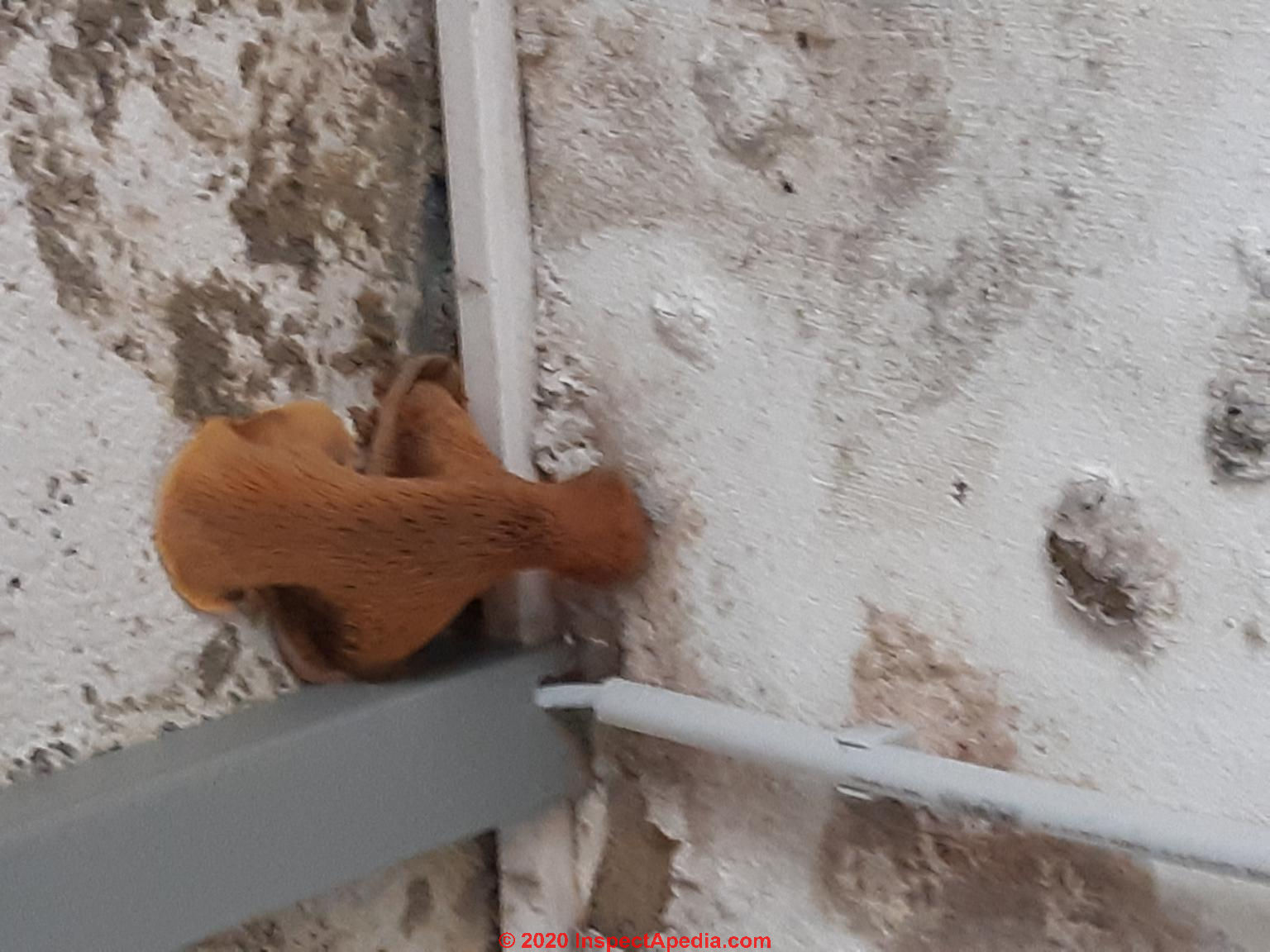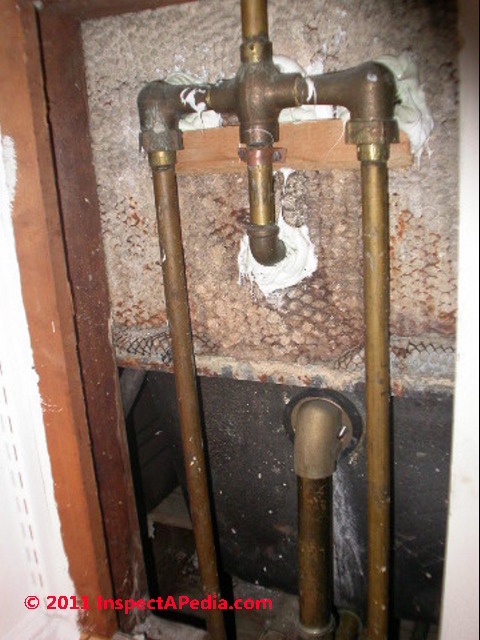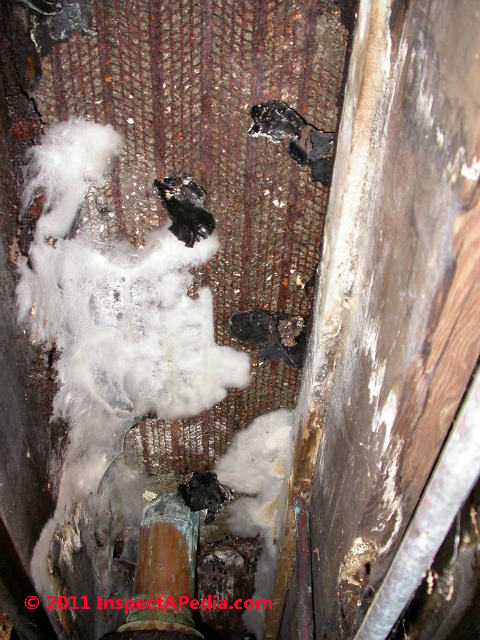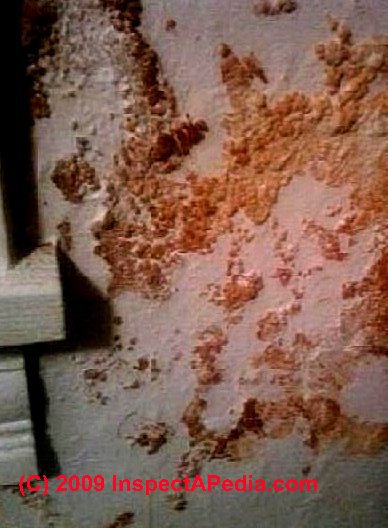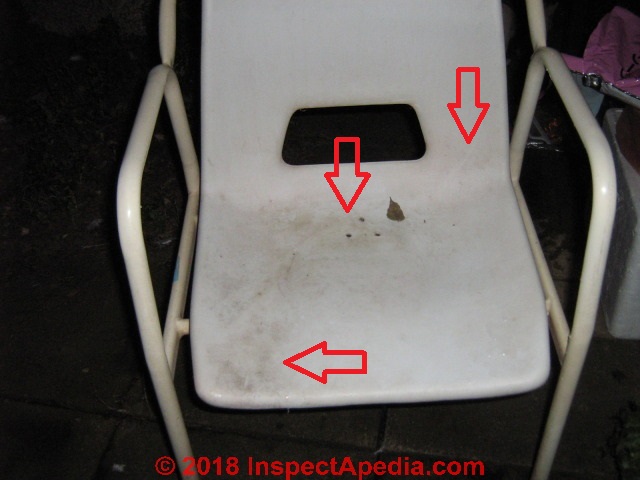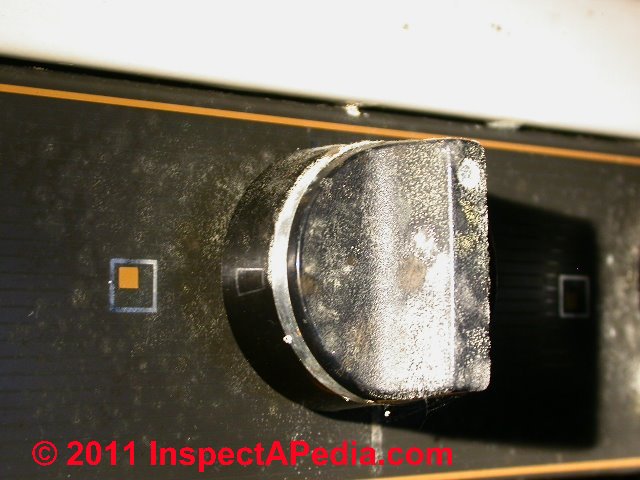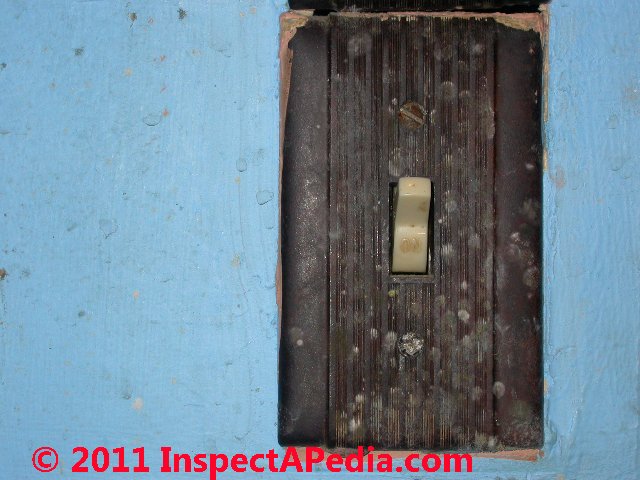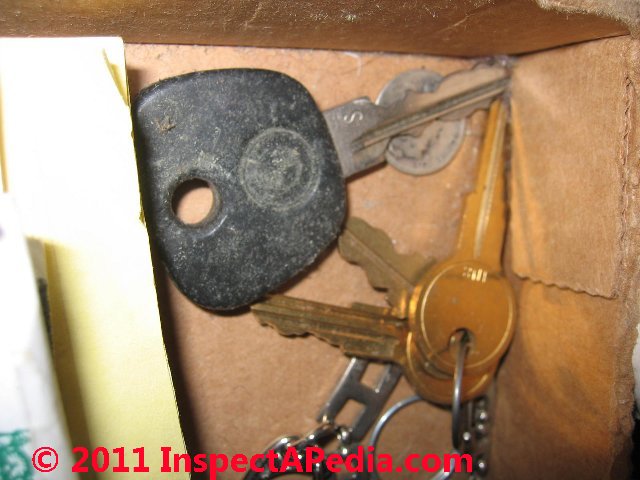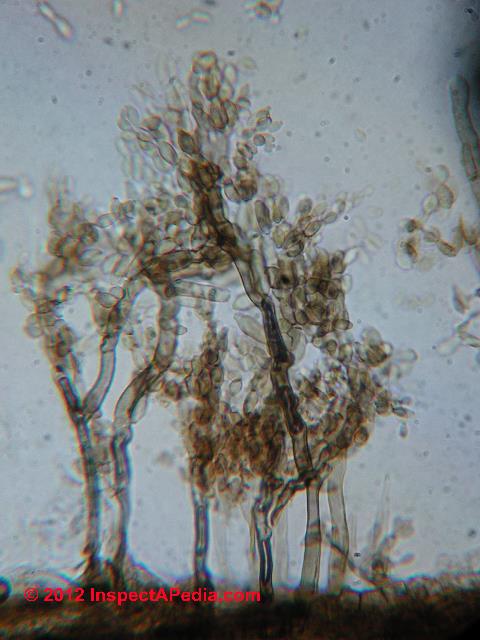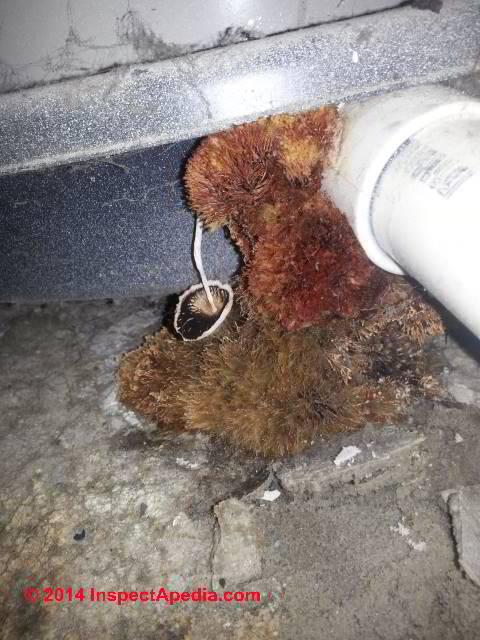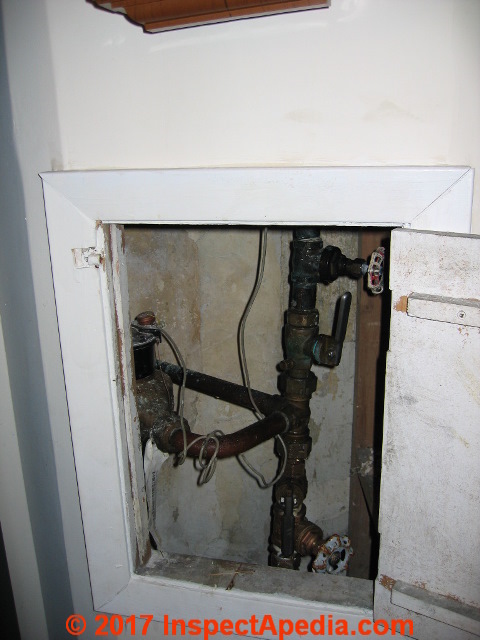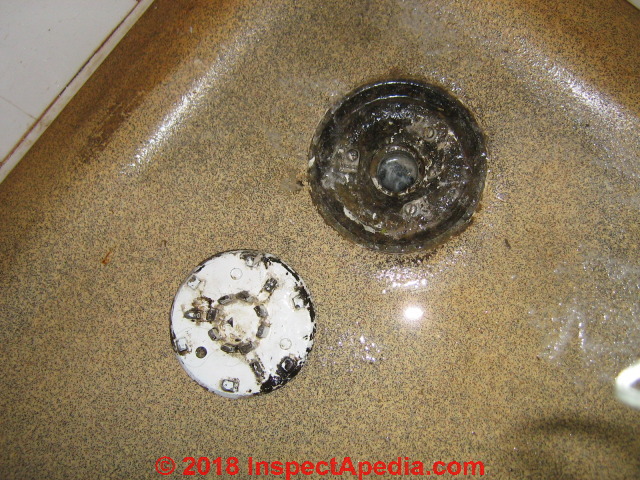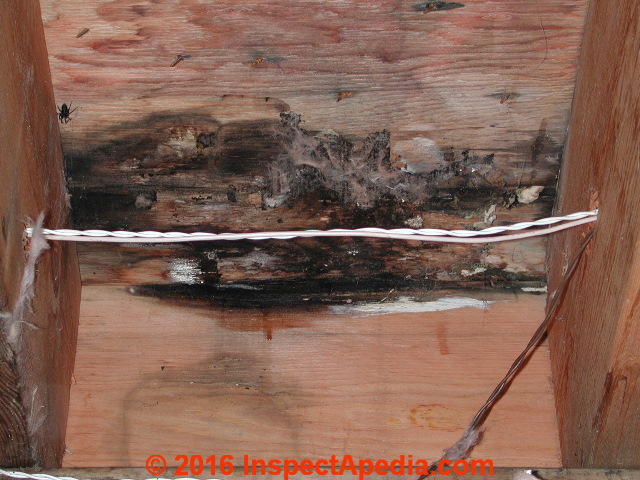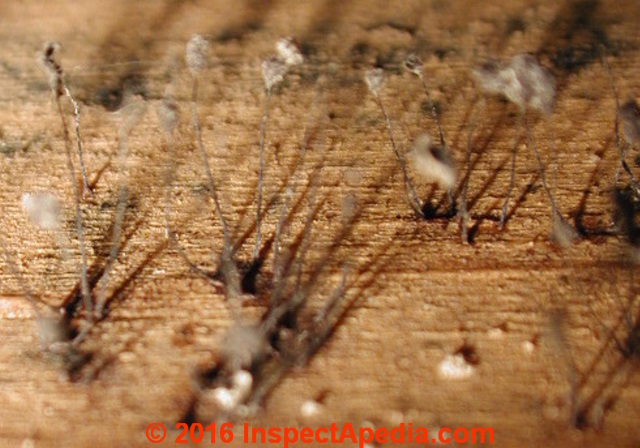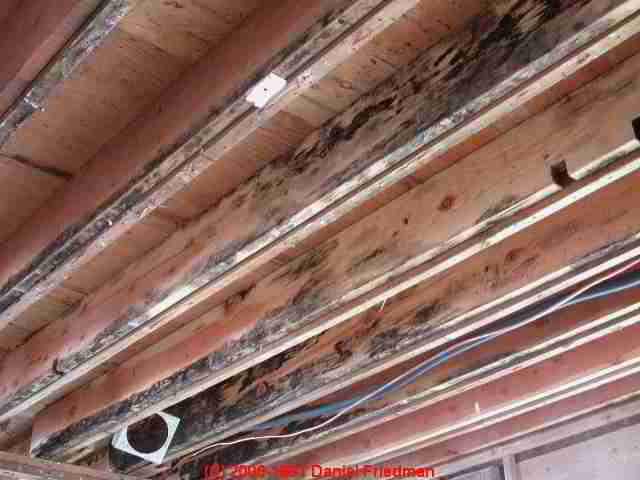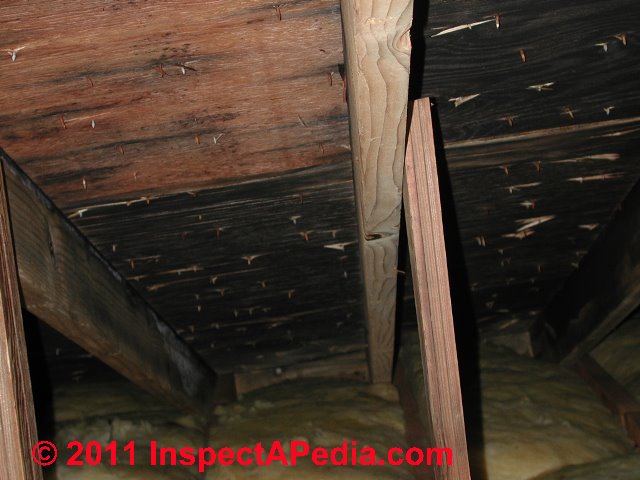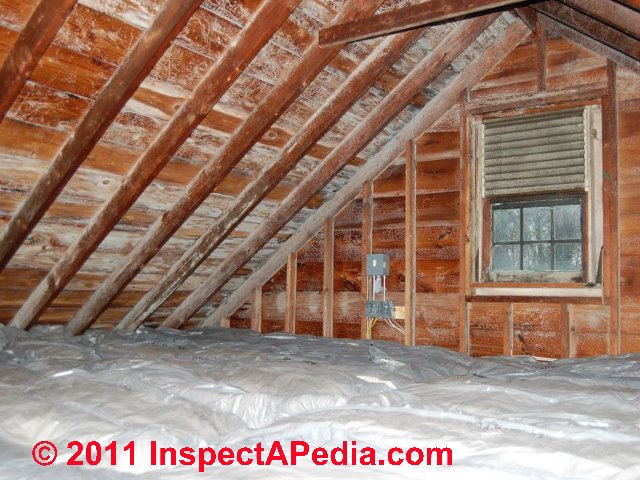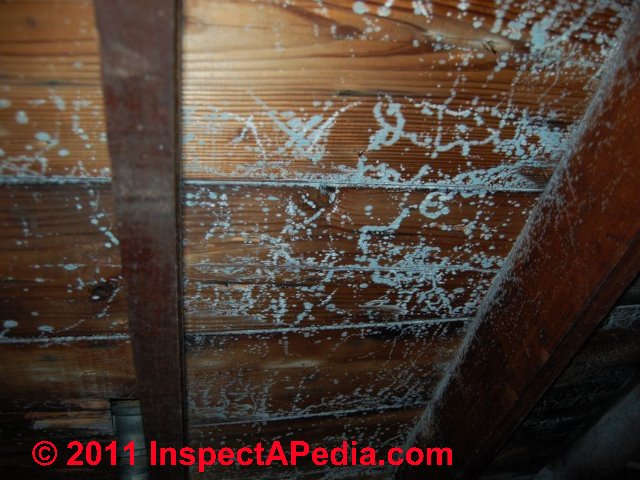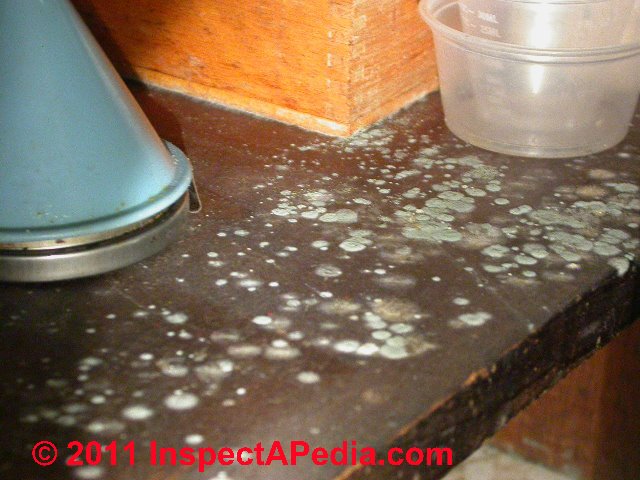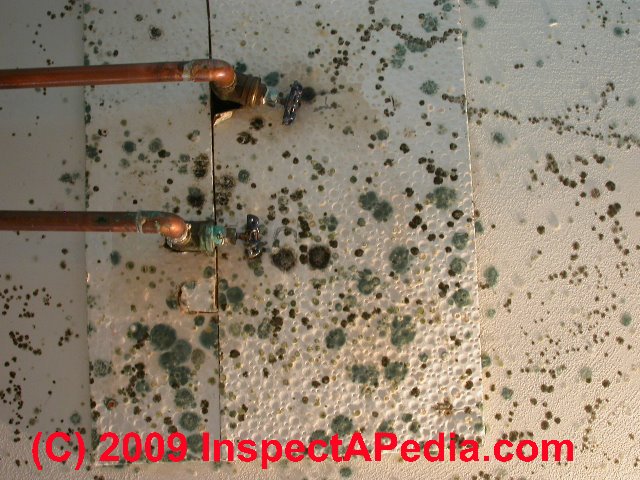 Mold In-Situ: Photos of Mold on Surfaces - Group 8
Mold In-Situ: Photos of Mold on Surfaces - Group 8
Appearance of Mold on Different Materials & Surfaces.
- POST a QUESTION or COMMENT about what mold looks like in buildings, including mobile homes and trailers
Photographs of mold growth in buildings:
Here is an photo guide to mold on plaster ceilings & walls, mold on plastic surfaces, mold on plastic nasal spray bottle, mold on plastic pipes, mold on PVC pipes, mold on plastic windows, mold on pottery, mold on ceramic surfaces, mold on rafters, mold on roof framing, mold on roof sheathing, mold on shelves, moldy shelving
What does mold look like growing on various building & other material surfaces? Here is an online reference photo library of various kinds of mold as it is found growing on a wide range of surfaces and materials found on or in buildings. These photos of mold on indoor various materials or "mold growth substrates" may help you recognize mold in buildings, recognize probably-cosmetic mold, and recognize stuff that is not mold and does not need to be tested.
InspectAPedia tolerates no conflicts of interest. We have no relationship with advertisers, products, or services discussed at this website.
- Daniel Friedman, Publisher/Editor/Author - See WHO ARE WE?
Pictures of Mold on Various Building Surfaces and Materials
For page loading speed we have divided this article into several sections. Use the link
MOLD APPEARANCE on VARIOUS SURFACES - INDEX
to return to the index / list of photographs of the appearance of mold on various building materials & contents.
--- MOLD GROWTH on MATERIAL SURFACES PHOTOS GROUP 8 ---
- MOLD on PLASTER CEILINGS, WALLS
- MOLD on PLASTIC SURFACES
- MOLD on PLASTIC NASAL SPRAY BOTTLE
- MOLD on PLASTIC PVC PIPES
- MOLD on PLASTIC WINDOWS
- MOLD on PLUMBING ACCESS
- MOLD on PLUMBING DRAIN
- MOLD on PLYWOOD
- MOLD on POTTERY, CERAMICS
- MOLD on PORECELAIN SURFACES
- MOLD on RAFTERS
- MOLD on ROOF SHEATHING
- MOLD on RUBBER
- MOLD on SHELVING
Photographs of mould found on the surface of items, materials, & surfaces found indoors
[Click to enlarge any image]
Mold on Plaster Walls, Ceilings
Our field investigation work and lab testing suggest that plaster is somewhat resistant to mold growth but by no means"mold proof".
Above: the fruiting body of a fungus or mold growing on plaster in a garage, courtesy of InspectApedia.com reader Michael.
We find mold growing on painted plaster surfaces and on occasion where leakage has been chronic some mold fungi appear to invade the plaster itself even though it is chemically inhospitable.
Below the red crud on this plaster wall is not mold.
See also EFFLORESCENCE & BROWN DEPOSITS for a discussion of stuff that looks as if it's "growing" on plaster walls and ceilings.
Mold on Plastic Surfaces

The photograph above illustrates mold growth on a plastic ceiling surface over a basement that had been subject to flooding.
Below is a rather moldy plastic shower chair from a U.K. home, contributed by reader Monica M.
Below, these two pictures show mold growth on plastic controls: the knob for a kitchen stove and on handle for an oven door handle.
This home had been subject to flooding that was undiscovered for at least several weeks.
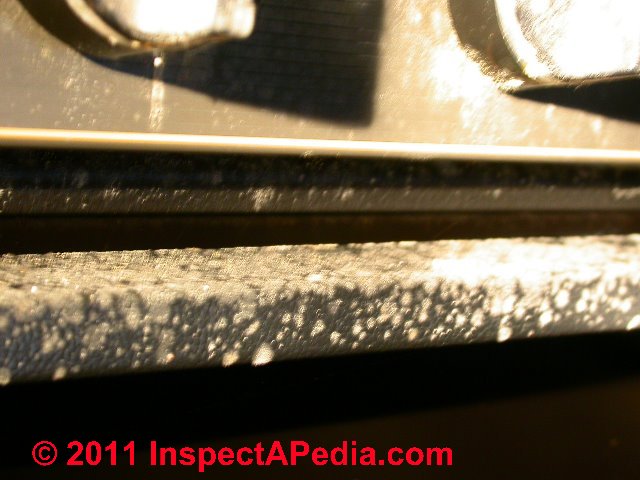
Other examples of mold growth on plastic surfaces commonly found in buildings are illustrated below: a plastic light switch cover hosting mold growth,
and plastic keys and other items stored in a drawer in a wet building.
Mold on Plastic Nasal Spray Bottle
The plastic nasal spray bottle sampled by a reader appeared clean when used and visibly moldy 8-10 hours later. We identified Cladosporium Sp. as the dominant fungus growing in the sample provided.
Mushrooms growing indoors on Plastic PVC Piping?
Mold on "plastic PVC piping" was the description of a reader who sent us the two photos shown here.
It's not quite clear from the images nor the data provided but but we think this indoor mushroom growth may actually have been rooting on soil at a foundation wall penetration.
We disuss the two coral-fungus like growth photos above
at MOLD & MUSHROOMS INDOORS on DIRT FLOORS.
Mold on Plastic Windows
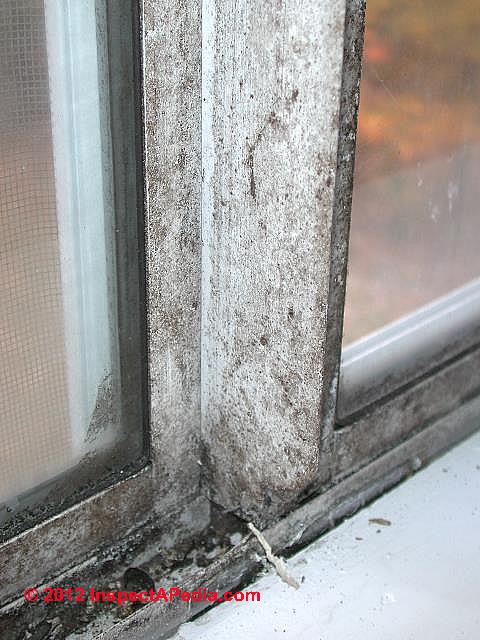
This really horrible moldy plastic window sash illustrates how mold growth may accumulate on a white plastic (or possibly vinyl) window sash, probably more severely at windows exposed to high levels of condensation.
The window condensation levels that encouraged this mold growth on the window frame may have been due to an indoor moisture source or due to inefficient windows that lack a thermal break to the outside, and that are installed in a cold climate.
Mold on or in Plumbing Access & Covers
Mold growth on surfaces inside of plumbing access niches or on plumbing access covers is common when condensation on cold water pipes causes an increase in moistur or perhaps wet conditions in the plumbing access niche or closet or other small enclosed area.
Mold on Plumbing Drains
Above, black and other mold and algae on shower drain parts in a UK home provided by reader Monica M.
Mold on Plywood Surfaces, un-painted subfloor & other
Above: leaks at a patio door were not obvious when inspecting the finished interior of this home except for a bit of dark staining on a finished oak floor. But inspecting from below we found several genera/species of mold including wood-rotters.
The subfloor and the top of the rim joist were damaged by rot.
Below: an enlarged view of fungal growth on a plywood surface in a different building.
Quite a few genera/species of mold may be found growing on plywood surfaces, especially in damp or poorly-vented attics (underside of roof sheathing or at gable-end walls) and on plywood subfloor surfaces over damp or wet basements or crawl spaces.
On plywood we often find species of Cladosporium, Taeoniella, Stemonitis, Trichoderma, and on occasion yeasts.
Also see MOLD on ROOF SHEATHING
Also see MOLD CLEANUP, WOOD FRAMING & PLYWOOD
Mold on Pottery, Ceramics
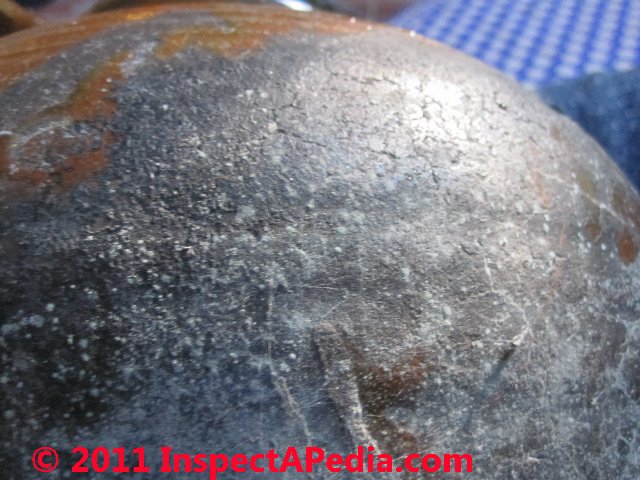
This photograph illustrates mold growth on antique Spanish pottery.
Mold on Porcelain surfaces
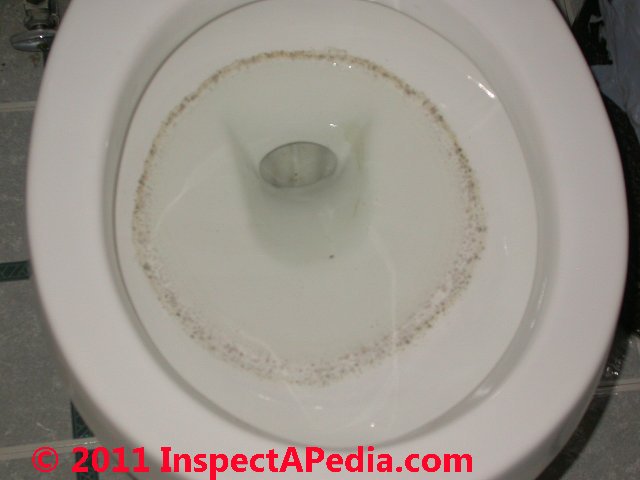
This moldy toilet bowl illustrates our theory that mold growth on some inhospitable surfaces relies on the presence of a coating of other organic debris.
More photos of bathroom mold are
at MOLD on TOILETS URINALS & OTHER PLUMBING FIXTURES
at MOLD on BATHROOM CONTROLS and surfaces
Mold on Rafters
Lots of different fungal genera/species will colonize framing lumber. It is worth learning to recognize "black mold" on wood framing that did not appear there by growing after construction, but rather came in as a hitchiker at the time the building was framed.
Often this fungus is a cosmetic-only bluestain or sapstain Ceratocystis or Ophistoma fungus.
We discuss how to recognize a harmless black mold, and cosmetic molds in our article:
Watch out: on pressure treated wood that has been colonized by Ceratocystis or Ophistoma fungus and thus would be though harmless, I have found Aspergillus colonizing atop the older fungus and happily living away on wood that was soaked with a chemical to treat against insect attack (and perhaps rot).
Where large amounts of such infected wood are used indoors it should probably be cleaned.
Mold on Roof Sheathing
The pictures here show common examples of mold found on the attic-side of roof sheathing.
For details also see MOLD ON / IN ATTICS and attic surfaces.
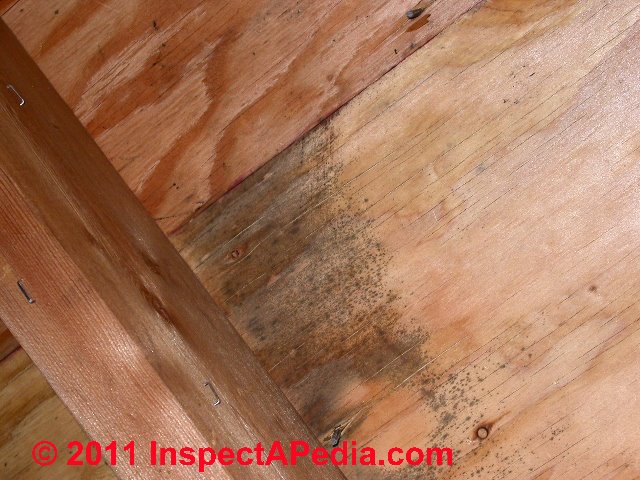
The photographs below illustrate mold growth on tongue and groove roof sheathing in an attic.
See ATTIC MOLD for a guide to curing and preventing mold contamination in attics and roof cavities.
Also see MOLD on FRAMING LULMBER, Joists, Studs, I-Joists
Also see MOLD on PLYWOOD
Mold on Rubber Materials & Surfaces
Below we see tan and yellow white-fringed "mushrooms" - a mold fruiting body - growing along the edge of what appears to be a rubber, or possibly vinyl baseboard trim at the intersection of a wall and a raw concrete floor in a wet basement. We also see mold growing on rubber garden hoses, rubber floor tile, and other rubber materials.
Photo contributed by reader [Anonymous] 2016/08/25 by private email. For this condition we recommended
... looking further for mold growth behind that baseboard trim in your photo, and more important, if the red wall is covered with drywall, I'd be looking for mold behind the trim and on the cavity side or hidden side of the drywall, paneling or whatever covers that wall.
Also see MOLD on GARDEN HOSE for other examples of mold growth on rubber or see MOLD on VINYL WINDOWS for examples of mold growth on vinyl.
Also see MOLD on FLOOR TRIM.
Mold on Shelving, Interior
These photos are examples of mold growth on shelving and a bookshelf surface. The furniture at right is a wood veneer material.
Watch out: remember to look under shelves for hidden mold. The un-coated back side of shelving or of bureau drawers are a ready home for hidden mold growth.
CONTACT us to submit photographs of mold growth on other man-made or building-related materials.
...
Continue reading at MOLD GROWTH on SURFACES, PHOTOS_GROUP_9 or select a topic from the closely-related articles below, or see the complete ARTICLE INDEX.
Or see these
Mold Identification Articles
- BLACK MOLD, HARMLESS
- MOLD APPEARANCE on VARIOUS SURFACES index to photos of mold on all kinds of surfaces and materials
- MOLD APPEARANCE - WHAT MOLD LOOKS LIKE - home
- MOLD APPEARANCE - STUFF THAT IS NOT MOLD
- MOLD ATLAS & PARTICLES INDEX
- MOLD FREQUENCY in BUILDINGS
- MOLD in BUILDINGS
- MOLD CONTAMINATION IN BUILDINGS - home
- MOLD by MICROSCOPE - mold under the microscope
- MOLD in the PETRI DISH, PHOTOS - mold on culture plates or in culture-type mold test kits
- MOLD RELATED ILLNESS SYMPTOMS
Suggested citation for this web page
MOLD GROWTH on SURFACES, PHOTOS_GROUP_8 at InspectApedia.com - online encyclopedia of building & environmental inspection, testing, diagnosis, repair, & problem prevention advice.
Or see this
INDEX to RELATED ARTICLES: ARTICLE INDEX to MOLD CONTAMINATION & REMEDIATION
Or use the SEARCH BOX found below to Ask a Question or Search InspectApedia
Ask a Question or Search InspectApedia
Try the search box just below, or if you prefer, post a question or comment in the Comments box below and we will respond promptly.
Search the InspectApedia website
Note: appearance of your Comment below may be delayed: if your comment contains an image, photograph, web link, or text that looks to the software as if it might be a web link, your posting will appear after it has been approved by a moderator. Apologies for the delay.
Only one image can be added per comment but you can post as many comments, and therefore images, as you like.
You will not receive a notification when a response to your question has been posted.
Please bookmark this page to make it easy for you to check back for our response.
IF above you see "Comment Form is loading comments..." then COMMENT BOX - countable.ca / bawkbox.com IS NOT WORKING.
In any case you are welcome to send an email directly to us at InspectApedia.com at editor@inspectApedia.com
We'll reply to you directly. Please help us help you by noting, in your email, the URL of the InspectApedia page where you wanted to comment.
Citations & References
In addition to any citations in the article above, a full list is available on request.
- A BRIEF GUIDE to MOLD, MOISTURE, and YOUR HOME, [PDF] U.S. Environmental Protection Agency US EPA - includes basic advice for building owners, occupants, and mold cleanup operations. See http://www.epa.gov/mold/moldguide.htm
- US EPA - MOLD REMEDIATION in SCHOOLS & COMMERCIAL BUILDINGS - US EPA
- US EPA - Una Breva Guia a Moho - Hongo [Copy on file as /sickhouse/EPA_Moho_Guia_sp.pdf - en Espanol
- [2] Dictionary of the Fungi, 9th Ed., PM Kirk, PF Cannon, JC David, && JA Stalpers Ed., CABI Publishing 2001 ISBN 0 85199 377 X www.cabi.org UK
- [9] Hyphomycetes their perfect and imperfect connexions, K. Tubaki, J Cramer 1981, ISBN 3-7682-1267-X
- [10] Dematiaceous Hyphomycetes, M.B. Ellis, CAB International 1971, ISBN 0-85198-027-8, Commonwealth Mycological Institute, Kew, Surrey, England, ABE-Print.com
- [11] More Dematiaceous Hyphomycetes, M.B. Ellis, CAB International 1976, ISBN 0-85198-3650-, Commonwealth Mycological Institute, Kew, w:st="on">Surrey, England
- [12] Illustrated Genera of Imperfect Fungi, 4th Ed., HL Barnett & Barry B. Hunter, American Phytopathological Society Press, St. Paul, 1998, ISBN 0-89054-192-2
- [13] Microfungi on Miscellaneous Substrates, Martin B. Ellis & J.Pamela Ellis, Crook Helm, London & Sydney 1988, ISBN 0-88192-115-7
- In addition to citations & references found in this article, see the research citations given at the end of the related articles found at our suggested
CONTINUE READING or RECOMMENDED ARTICLES.
- Carson, Dunlop & Associates Ltd., 120 Carlton Street Suite 407, Toronto ON M5A 4K2. Tel: (416) 964-9415 1-800-268-7070 Email: info@carsondunlop.com. Alan Carson is a past president of ASHI, the American Society of Home Inspectors.
Thanks to Alan Carson and Bob Dunlop, for permission for InspectAPedia to use text excerpts from The HOME REFERENCE BOOK - the Encyclopedia of Homes and to use illustrations from The ILLUSTRATED HOME .
Carson Dunlop Associates provides extensive home inspection education and report writing material. In gratitude we provide links to tsome Carson Dunlop Associates products and services.


